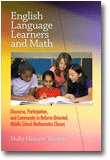
English Language Learners and Math
Discourse, Participation, and Community in Reform-Oriented, Middle School Mathematics Classes
By:
Holly Hansen-Thomas, Texas Woman’s University
Published 2009
Taking a community of practice perspective that highlights the learner as part of a community, rather than a lone individual responsible for her/his learning, this ethnographically-influenced study investigates how Latina/o English Language Learners (ELLs) in middle school mathematics classes negotiated their learning of mathematics and mathematical discourse. The classes in which the Latina/o students were enrolled used a reform-oriented approach to math learning; the math in these classes was—to varying degrees—taught using a hands-on, discovery approach to learning where group learning was valued, and discussions in and about math were critical.
This book presents the stories of how six immigrant and American-born ELLs worked with their three teachers of varied ethnicity, education, experience with second language learners, and training in reform-oriented mathematics curricula to gain a degree of competence in the mathematical discourse they used in class. Identity, participation, situated learning, discourse use by learners of English as a Second Language (ESL), framing in language, and student success in mathematics are all critical notions that are highlighted within this school-based research.
CONTENTS
Introduction. Guide to Transcription Conventions. 1 Background. 2 Introducing the Three Communities. 3 Communities of Practice in Three Sixth-Grade Math Classes. 4 Frames as Play and Participation Frameworks in Reform Math. 5 What Is Mathematical Discourse, How Is it Used, and Who Is Successful at It? 6 Conclusions and Implications. References. About the Author.
-
Paperback978-1-60752-148-8
Web price: $45.04 (Reg. 52.99)
-
Hardcover978-1-60752-149-5
Web price: $80.74 (Reg. 94.99)
- eBook9781607522553

- EDU015000 - EDUCATION: Higher
- EDU037000 - EDUCATION: Research
- MAT030000 - MATHEMATICS: Study & Teaching
-
 (Re)Envisioning Social Studies Education Research
Current Epistemological and Methodological Expansions, Deconstructions, and Creations
(Re)Envisioning Social Studies Education Research
Current Epistemological and Methodological Expansions, Deconstructions, and Creations
-
 Creating New Possibilities for the Future of HBCUs
From Research to Praxis
Creating New Possibilities for the Future of HBCUs
From Research to Praxis
-
 Expanding the Vision of Faculty Learning Communities in Higher Education
Emerging Opportunities for Faculty to Engage Each Other in Learning, Teaching, and Support
Expanding the Vision of Faculty Learning Communities in Higher Education
Emerging Opportunities for Faculty to Engage Each Other in Learning, Teaching, and Support
-
 Faculty Learning Communities
Working Towards a More Equitable, Just, and Antiracist Future in Higher Education
Faculty Learning Communities
Working Towards a More Equitable, Just, and Antiracist Future in Higher Education
-
 Institutional Diversity in American Postsecondary Education
Institutional Diversity in American Postsecondary Education
-
 Promoting Equitable Classroom Practices in Higher Education
Approaches Beyond Curriculum
Promoting Equitable Classroom Practices in Higher Education
Approaches Beyond Curriculum
-
 The Handbook for Aspiring Higher Education Leaders
The Handbook for Aspiring Higher Education Leaders

